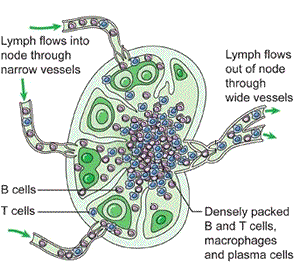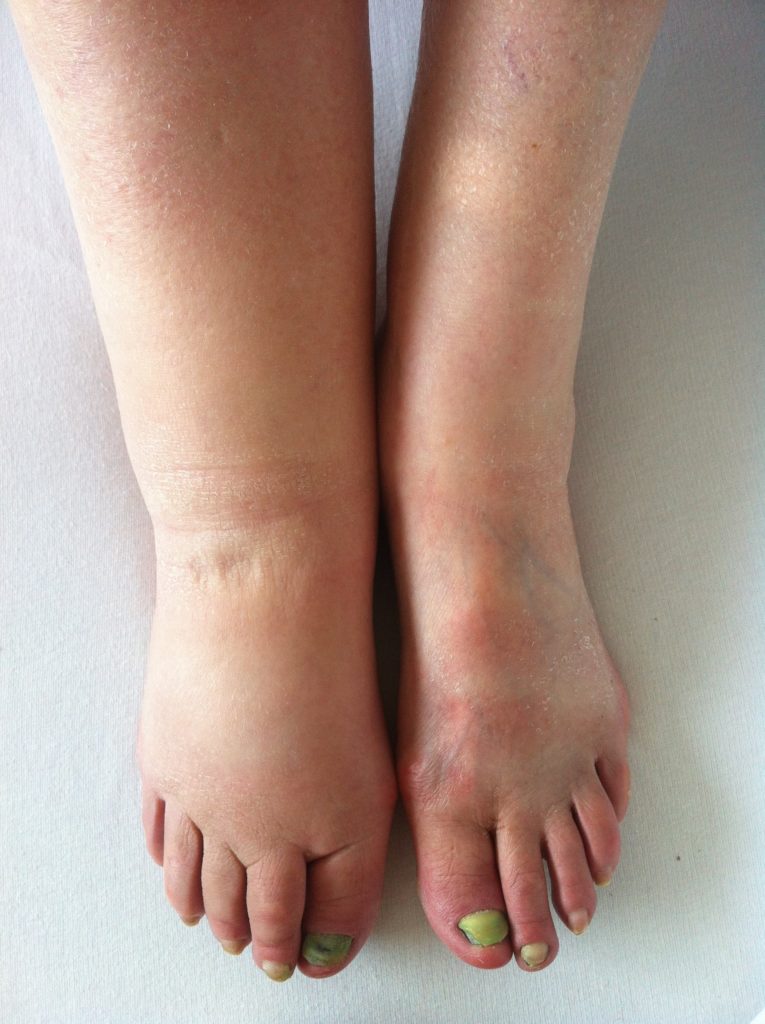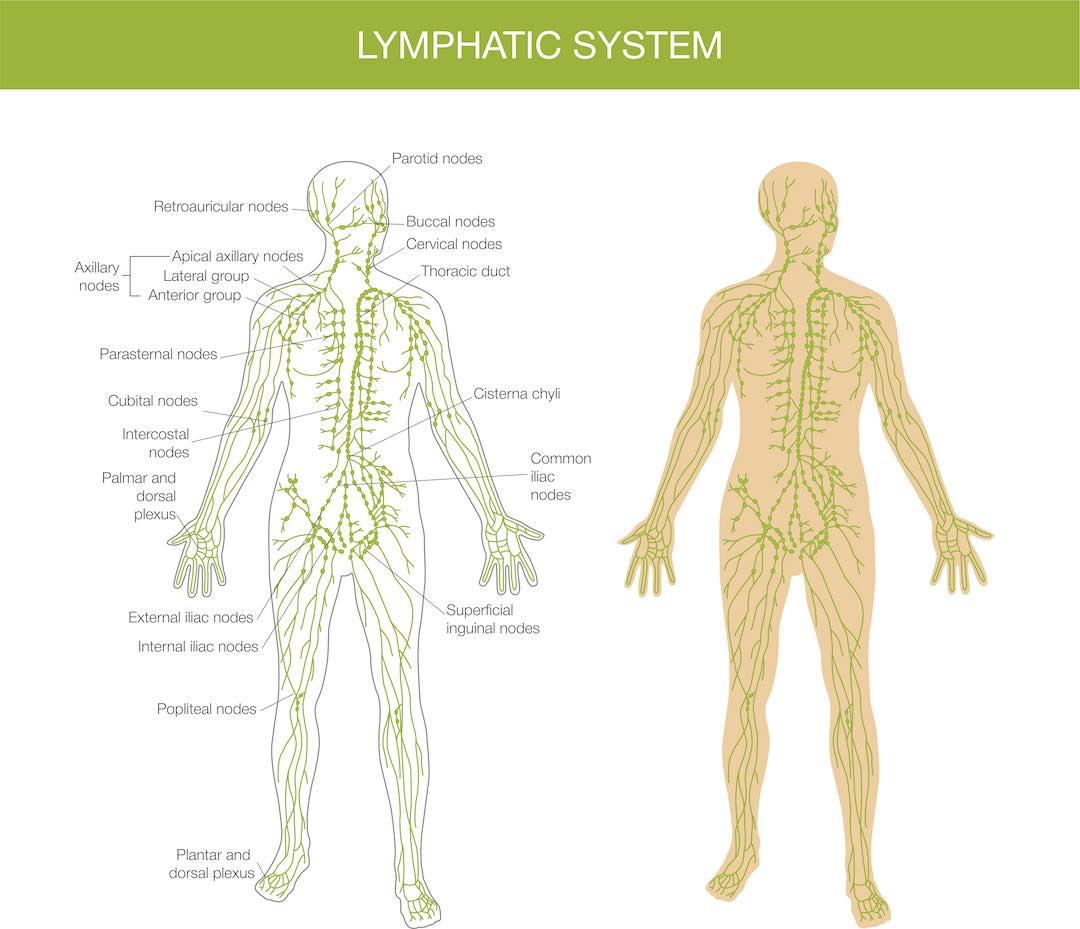You have heard of the body’s lymphatic system, but how well do you know of its function and the role it plays in our body’s daily function?
The fact is that the lymphatic system is involved in such complex diverse (multitude) ways that it is difficult to do a simple introduction of this important system. It is therefore not surprising that most may not have a good enough understanding of our lymphatic system and how it works.
The lymphatic system is an extensive drainage network comprising of lymphoid organs, lymph ducts, lymph tissues, lymph capillaries and lymphatic vessels that carry lymph and other substances throughout the body. There are hundreds of lymph nodes in the human body. They are located deep inside the body, such as around the lungs and heart, or closer to the surface, such as under the arm or groin.
Functions of the lymphatic system and how it works
Essentially, the lymphatic system is responsible for 3 Major functions of the body:
- Maintain the balance of our bodily fluid by returning fluid to the heart
- Help large molecules enter the blood
- Immune surveillance
Lymphatic vessels, also known as lymphatics, are responsible for maintaining the balance of the body fluids. As blood moves through the arteries and veins, 10% of the fluid filtered by the capillaries, along with vital proteins and antigens, leaks out into the interstitial space and becomes trapped in the tissues of the body. The lymphatic system collects this fluid through lymphatic vessels, also known as lymphatics, and returns it to the circulatory system.
The lymph is released back into the circulatory system through two major ducts at the neck area: right lymphatic duct and thoracic duct (also known as left lymphatic duct). This removal of excess fluids from body tissues is crucial because water, proteins, and other substances are continuously leaking out of tiny blood capillaries into the surrounding body tissues. If the lymphatic system didn’t drain the excess fluid from the tissues, the lymph fluid would build up in the body’s tissues, and they would swell.
The lymphatic system plays an integral role in the immune functions of the body. It is the first line of defence against disease. Lymphoid organs remove foreign material in lymph from entering the bloodstream and act as lookouts in the immune system. When lymph drains to a nearby lymph node, pathogens are detected and allows the system to elicit an immune response and prevent the onset of illness and diseases from invading microorganisms. The spleen also helps the body fight infection. The spleen contains lymphocytes and another kind of white blood cell called macrophages, which engulf and destroy bacteria, dead tissue, and foreign matter and remove them from the blood passing through the spleen.

Source: dynamicscience.com.au
The lymphatic system helps deliver nutrients to our tissues and removes wastes from them. For instance, Fatty acids get packaged into chylomicrons at the small intestines and since they are too big to move to enter the bloodstream through the capillaries, they are instead dumped back into the blood at the thoracic duct via our body’s lymphatic vessels.
Unlike our circulatory system where the heart pumps blood around the body, our lymphatic system does not have a pump. Instead, the unidirectional flow of lymph is maintained by intraluminal valves and smooth muscles in lymph vessels that react to arterial pulse and skeletal muscle.
Since the lymph system must be pumped by the movement of our muscles, the less we move, the more stagnant our lymph system becomes. With today’s sedentary lifestyle, pollution, diets low in nutrients and high in fats, sugars, additives, preservatives and, because most of us fail to drink enough pure water to assist our body to eliminate toxins, our lymphatic system becomes overloaded, congested and clogged. Fatigue, stress, infection, emotional shock, lack of physical activity or dehydration may also stagnate the flow of lymph. Consequently, as toxins accumulate, cells are unable to function properly resulting in various metabolic and infectious problems.
Effects of a malfunctioning lymphatic system
Although further studies still have to be made, many existing studies have observed a correlation between lymphatic vascular defects and obesity, hypertension as well as other metabolic disorders. This is because the immune response and metabolic regulation are highly integrated and the proper function of each is dependent on the other. In addition, research on mouse models has shown that the magnitude of obesity was correlated to the extent of disorganization and leakage of the lymphatic vessels, with the oldest and most obese mice having the most severely disrupted lymphatics. On the other hand, the inability by lymphatics in our small intestines to pick up lipids will result in malabsorption.

Aside from impacting our metabolic system, when the nodes, ducts, vessels or lymph tissues become blocked, infected, inflamed or cancerous, the lymphatic system can become dysfunctional and result in various lymphatic conditions.
Common lymphatic conditions
A common disorder of the lymphatic system is lymphoedema, a condition caused by a built up of fluid in tissues that result in swelling. It generally occurs in arms or legs and is usually caused by removal or damage to lymph nodes. This failure to drain fluid properly causes accumulation of protein-rich fluid combined with inflammation, adipose tissue hypertrophy, and progressive fibrosis, ultimately leading to reduced quality of life, functional impairment, and physical deformity.
Infection can lead to enlargement of the lymph nodes due to an increased immune response in the area in order to fight off foreign pathogens. This is known as lymphadenopathy.
The least common but most serious lymphatic disease is lymphoma, which is the formation of cancer cells in lymph nodes. Lymphoma is usually secondary and arises when cancer spreads from a primary tumour (such as in the breast) to nearby or regional lymph nodes. It is rare for a cancer to start in the lymphatic system itself (a primary cancer).
Other than the aforementioned, there are many other problems that result from a dysfunctional lymphatic system.
How can you maintain a healthy lymphatic system?
In light of how important the lymphatic system is in taking care of our body’s various functions, it is pertinent that we make a conscientious effort in keeping our lymphatic system “healthy”. Aside from moderation in diet, doing regular exercises and proper hydration are important to promote good lymphatic circulation.
Other than good lifestyle habits, there are various related therapies available that may help achieve a healthier lymphatic system. Lymphatic Drainage Massage is a profoundly effective technique to help increase the body’s natural flow of lymph by increasing lymphatic circulation through the body’s natural filtration systems. This increased circulation assists in detoxifying the body and supports our health.
Electro-Lymphatic Therapy (ELT) is a gentle, light touch non-invasive technique that works in the same way as a lymphatic drainage massage and stimulates the proper flow and drainage of the lymphatic system. The main difference is that ELT can stimulate the lymph at a greater depth and will enhance lymph flow with far less therapy time.

Currently, in spite of the vital roles played by the lymphatic system in both lipid transport and immune surveillance, the pathophysiology of this system has not been studied widely compared to other systems in our body.
However, there is an increasing focus on the study of our lymphatic system due to a greater understanding of its roles and involvement in various body functions. With more discoveries made on the lymphatic system, hopefully, more people from the general public will come to appreciate this underrated underappreciated system in our body more and treat their lymphatic system better.
Article by
Hannie Hong (Oriental Remedies Group, Singapore), a registered therapist certified by the Lymphology Association of Asia
Need treatment?
Find out possible treatments for you:
Call/Whatsapp us at +65 8087 0486.
Disclaimer:
The information on this page is for information and educational purposes only. Such medical information may relate to disease, injury, drugs and other treatments, medical devices and/or health products. Medical information does not amount to advice, and if advice is needed an appropriate professional help should be sought. The disclaimer asserts that no warranties or representations are given in respect of the medical information, and that the website operator should not be held liable if a user suffers any injury or loss after relying upon the medical information.
Electro-Lymphatic Therapy using Lymph-Drainage XP-II is intended for use only for general well-being purposes or to encourage or maintain a healthy lifestyle, and it is not intended to be used for any medical purposes (such as detection, diagnosis, monitoring, management or treatment of any medical condition or disease). Please consult a physician for any medical advice required.


